Fermented rice water is a traditional hair care remedy that has been used for centuries in many parts of Asia. It is believed to have numerous benefits for hair, including promoting hair growth, strengthening hair strands, and improving hair texture. Fermented rice water contains inositol, a carbohydrate that can penetrate damaged hair and repair it from the inside out.
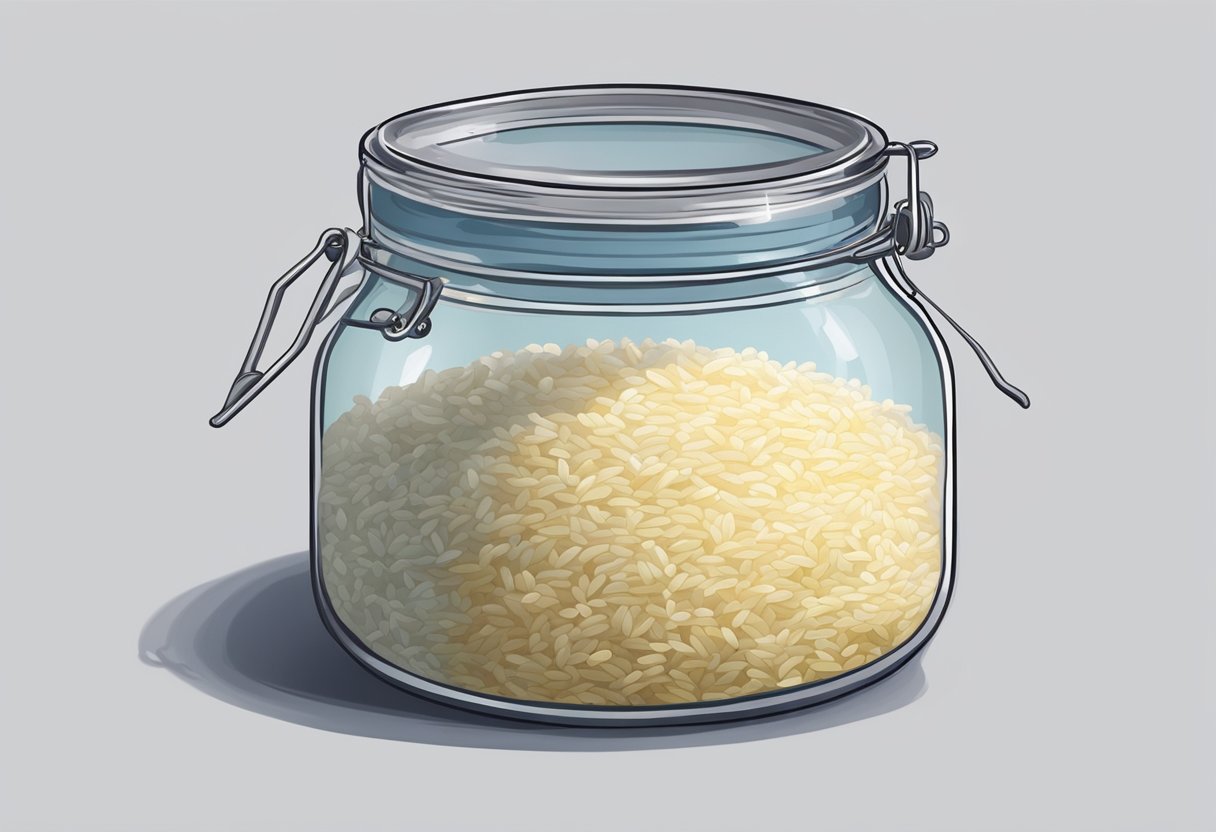
To make fermented rice water, you will need uncooked rice, water, and a lidded bottle. There are several methods for preparing rice water, including the boil method, soak method, and fermented method. Each method has its own advantages and disadvantages, but all require the same basic ingredients. The fermented method is believed to be the most effective, as it allows beneficial microorganisms to grow in the water and enhance its nourishing properties.
Before using fermented rice water on your hair, it is important to test it on a small area of skin to make sure you are not allergic to it. Once you have confirmed that you are not allergic, you can use fermented rice water as a hair rinse after shampooing. Simply pour the rice water over your hair and massage it into your scalp for a few minutes before rinsing it out with warm water. With regular use, fermented rice water can help you achieve healthier, stronger, and more beautiful hair.
Understanding Fermented Rice Water
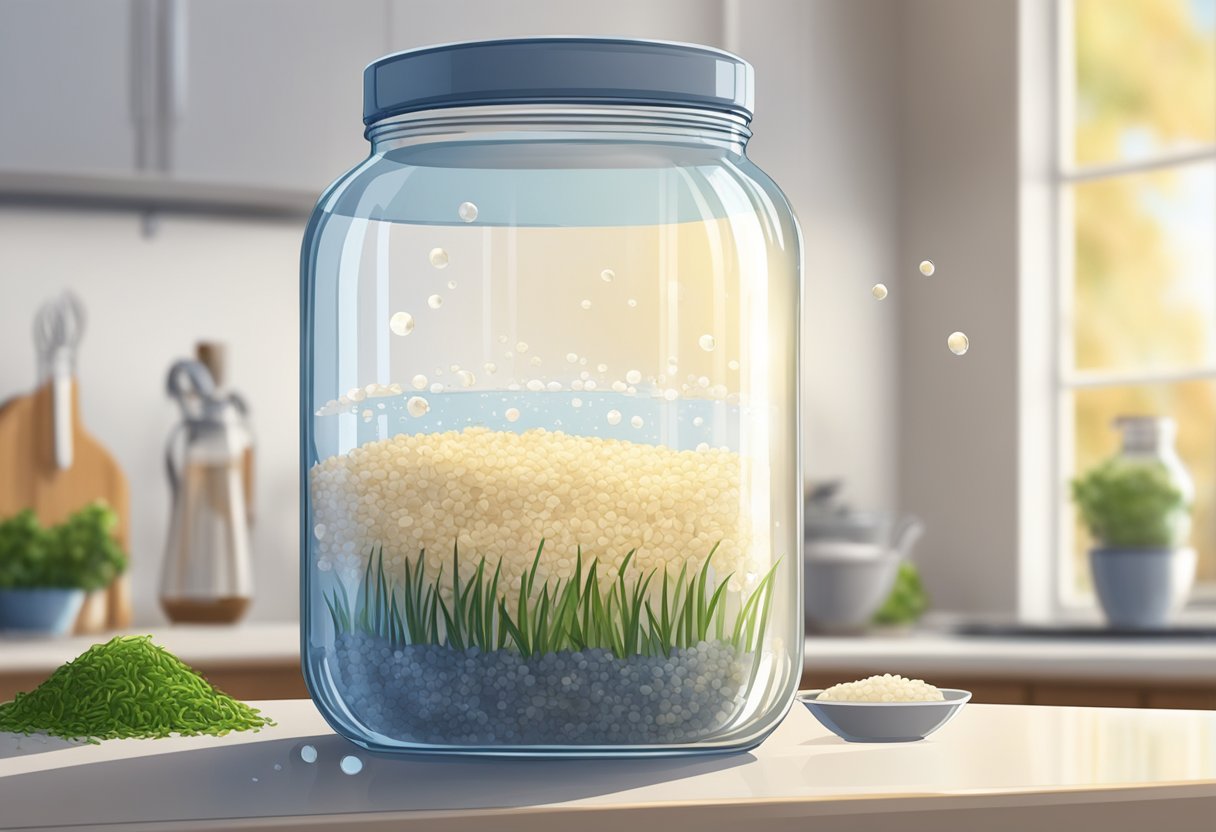
History and Cultural Significance
Fermented rice water has been used for centuries in Asian cultures, particularly in Japan and China, as a hair treatment. The Yao women of Huangluo Village in China are known for their incredibly long hair, which they attribute to washing their hair with fermented rice water. The practice is also common in Japan, where it is called “Yu-Su-Ru.”
Benefits for Hair Health
Fermented rice water is believed to have several benefits for hair health. It is said to contain inositol, a carbohydrate that can strengthen hair and promote growth. It is also rich in vitamins and minerals, including amino acids, vitamin E, and antioxidants, which can nourish and protect hair. Additionally, fermented rice water can help to balance the pH of the scalp, which can improve the overall health of the hair.
Science Behind Fermentation
The fermentation process that creates fermented rice water involves leaving rice water to sit at room temperature for a period of time, typically 24-48 hours. During this time, the carbohydrates in the rice water are broken down by bacteria and yeast, creating a slightly acidic liquid. This process is believed to increase the concentration of inositol and other beneficial compounds in the rice water, making it more effective as a hair treatment.
Overall, fermented rice water is a natural and potentially effective way to promote hair health. While more research is needed to fully understand its benefits, the long history of use in Asian cultures suggests that it may be worth trying as a hair treatment.
Preparing to Make Fermented Rice Water

Choosing the Right Rice
When it comes to preparing fermented rice water for hair, choosing the right type of rice is crucial. The best rice to use is usually white rice, but brown rice can also be used. It is essential to avoid using instant rice or quick-cooking rice as they do not contain enough starch to make a good fermented rice water.
Gathering Needed Supplies
Before making fermented rice water, it is crucial to gather all the necessary supplies. Here are the things you will need:
-
Rice: As discussed earlier, it is best to use white rice or brown rice.
-
Water: You will need clean, filtered water to make fermented rice water.
-
A jar: You will need a glass jar with a tight-fitting lid to ferment the rice water.
-
Cheesecloth or coffee filter: You will need a cheesecloth or coffee filter to cover the jar while fermenting the rice water.
-
Bowl: You will need a bowl to soak the rice in.
-
Strainer: You will need a strainer to strain the rice water after fermentation.
-
Essential oils (optional): You can add essential oils like rosemary or peppermint to the fermented rice water to enhance its benefits.
By gathering all the necessary supplies beforehand, you can make the process of preparing fermented rice water for hair much more manageable and stress-free.
Creating Fermented Rice Water
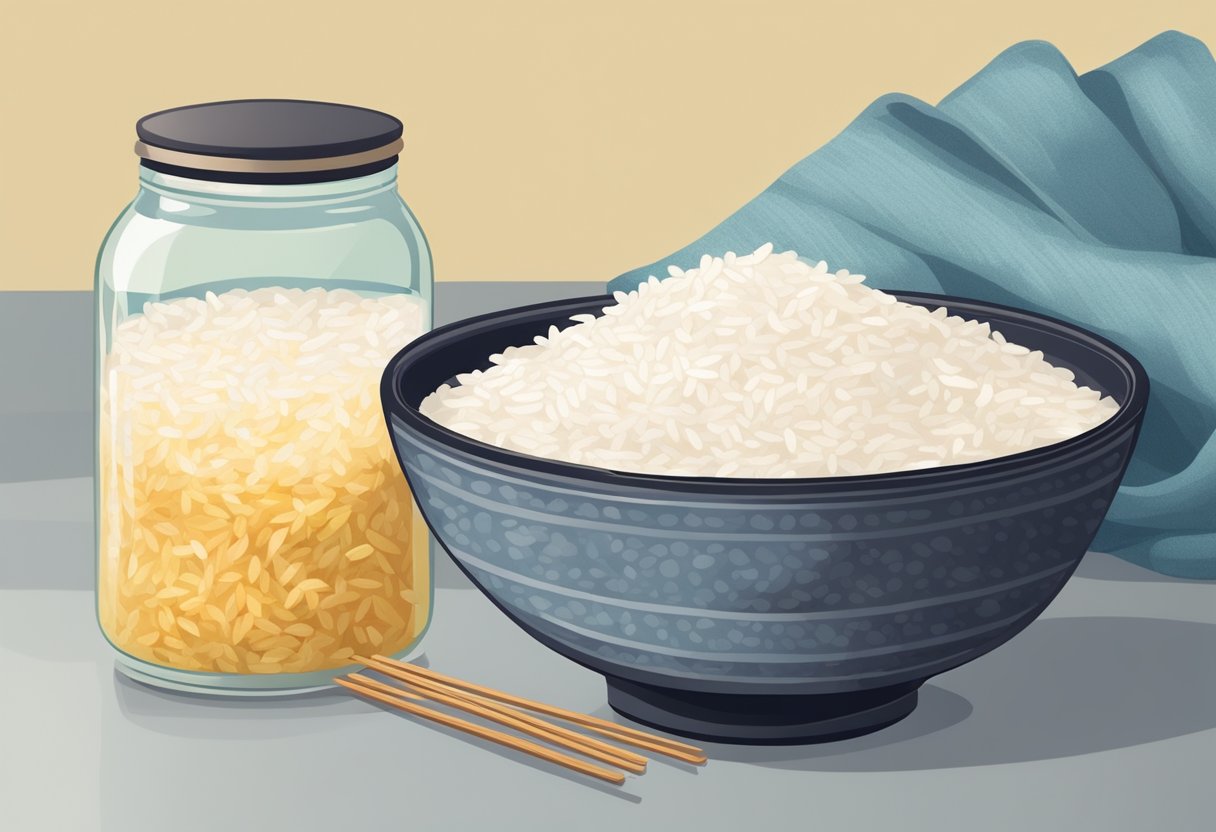
Fermented rice water is a natural and cost-effective hair treatment that has been used for centuries. It contains vitamins, minerals, and amino acids that promote hair growth and strengthen the hair. Here are the steps to create fermented rice water:
Rinsing and Soaking the Rice
To start, rinse 1 cup of uncooked white or brown rice with water to remove any dirt or impurities. Then, soak the rice in 2 cups of water for at least 30 minutes. This will allow the rice to release its nutrients into the water.
Straining and Fermenting
After soaking, strain the rice water into a lidded bottle or jar. Leave the jar at room temperature for 1-2 days to allow the rice water to ferment. The fermentation process will create a slightly sour smell, which is normal and indicates that the rice water is ready.
Enhancing with Essential Oils or Herbs
For added benefits, you can enhance the fermented rice water with essential oils or herbs. Lavender oil, rosemary oil, and peppermint oil are all great options for promoting hair growth and soothing the scalp. Simply add a few drops of your chosen oil to the fermented rice water and shake well. Alternatively, you can add herbs such as rosemary or chamomile to the rice water during the soaking process to infuse it with their natural properties.
In conclusion, creating fermented rice water is a simple and effective way to promote healthy hair growth and improve the overall health of your hair. By following these easy steps and enhancing the rice water with essential oils or herbs, you can create a personalized hair treatment that is gentle, natural, and effective.
Using Fermented Rice Water

Application Techniques
To apply fermented rice water to the hair, start by washing the hair with regular shampoo and rinsing thoroughly. Do not condition the hair. After rinsing, saturate the hair with fermented rice water. The easiest way to do this is to lean back and pour the water at the top of the forehead, running the water through the hair.
Another application technique is to use a spray bottle to mist the hair with the fermented rice water. This method is especially useful for individuals with longer hair. Simply fill a spray bottle with the fermented rice water and mist the hair until it is fully saturated.
Frequency and Duration of Treatment
The frequency and duration of treatment may vary depending on the individual’s hair type and desired results. It is recommended to use fermented rice water on the hair once or twice a week.
For individuals with oily hair, it is recommended to use fermented rice water once a week. For individuals with dry hair, it is recommended to use fermented rice water twice a week.
The duration of treatment may also vary depending on the desired results. For general hair health and maintenance, it is recommended to use fermented rice water for at least four weeks. For individuals looking to promote hair growth, it is recommended to use fermented rice water for at least eight weeks.
In conclusion, using fermented rice water on the hair can provide numerous benefits such as promoting hair growth, improving hair texture, and strengthening hair strands. By following the recommended application techniques and frequency of treatment, individuals can achieve healthy and lustrous hair.
Storing Fermented Rice Water

After preparing fermented rice water, it is essential to store it properly to maintain its effectiveness. Here are some tips on how to store fermented rice water.
Refrigeration and Shelf Life
Fermented rice water should be stored in a lidded bottle or container and kept in the refrigerator. It can last up to five days in the fridge. It is crucial to keep the container covered to prevent the growth of bacteria and other microorganisms.
Signs of Spoilage
It is essential to check the fermented rice water for signs of spoilage before use. If it smells sour or rancid, it is no longer safe to use. It is also essential to check for mold growth or discoloration. If there are any signs of spoilage, discard the fermented rice water immediately.
In conclusion, storing fermented rice water is crucial to maintain its effectiveness. By following the above tips, you can ensure that your fermented rice water lasts longer and remains safe to use.
Troubleshooting Common Issues
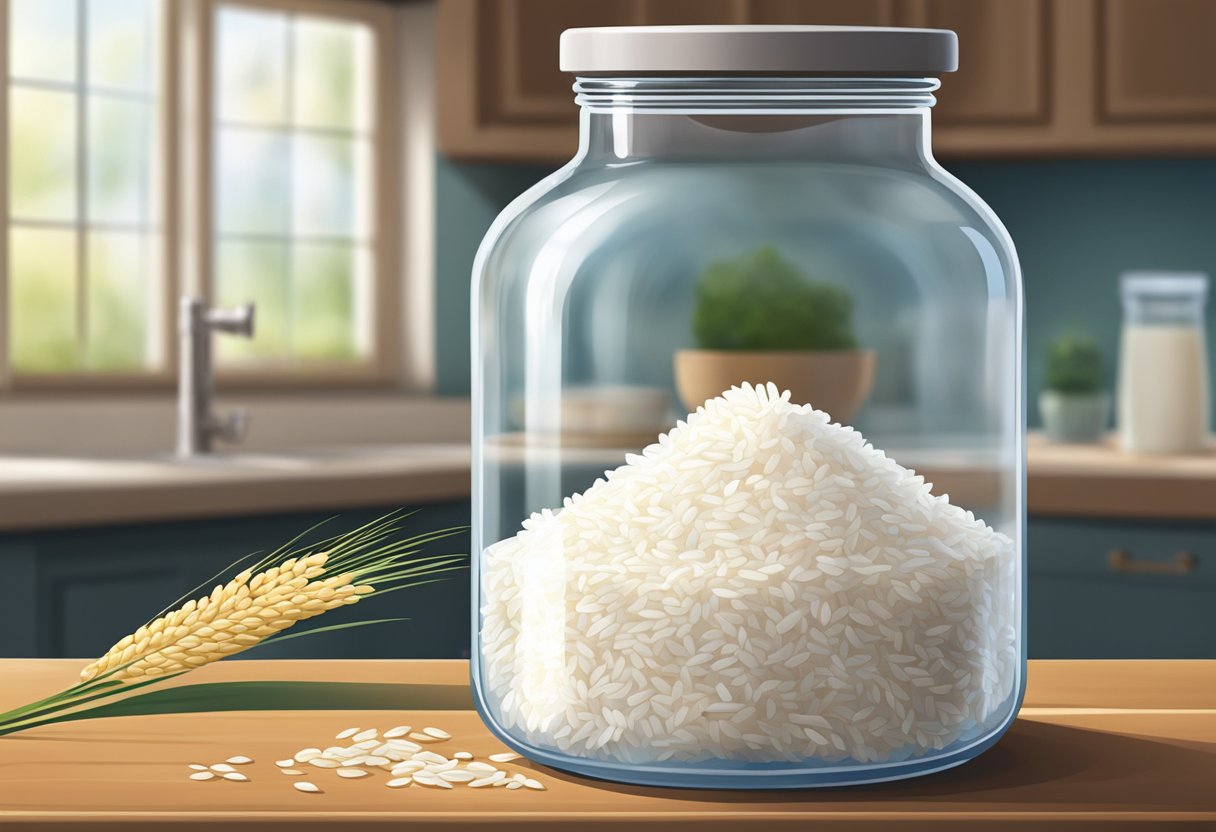
While fermented rice water can provide numerous benefits for hair, some people may experience issues when using it. Here are some common problems and ways to troubleshoot them:
Issue: Unpleasant Odor
Fermented rice water can have a sour or unpleasant odor, which can be off-putting to some people. This is a normal part of the fermentation process, but there are ways to minimize the smell.
Solution: Try adding a few drops of essential oil, such as lavender or peppermint, to the rice water. This can help mask the odor and leave a pleasant scent on your hair. Alternatively, you can rinse your hair with plain water after using the rice water to remove any lingering smell.
Issue: Scalp Irritation
Some people may experience scalp irritation or itching after using fermented rice water. This could be due to the acidity of the rice water or an allergic reaction.
Solution: If you experience scalp irritation, try diluting the rice water with plain water before using it. You can also try using a different type of rice or fermenting the rice water for a shorter period of time. If the irritation persists, stop using rice water and consult a dermatologist.
Issue: Hair Dryness
While fermented rice water can help strengthen hair, it can also cause dryness if used too frequently or left on for too long.
Solution: Limit the use of rice water to once or twice a week, and rinse your hair thoroughly after using it. You can also try mixing the rice water with a moisturizing ingredient, such as aloe vera or honey, to prevent dryness.
By following these tips, you can troubleshoot common issues when using fermented rice water and enjoy its benefits for your hair.
Frequently Asked Questions
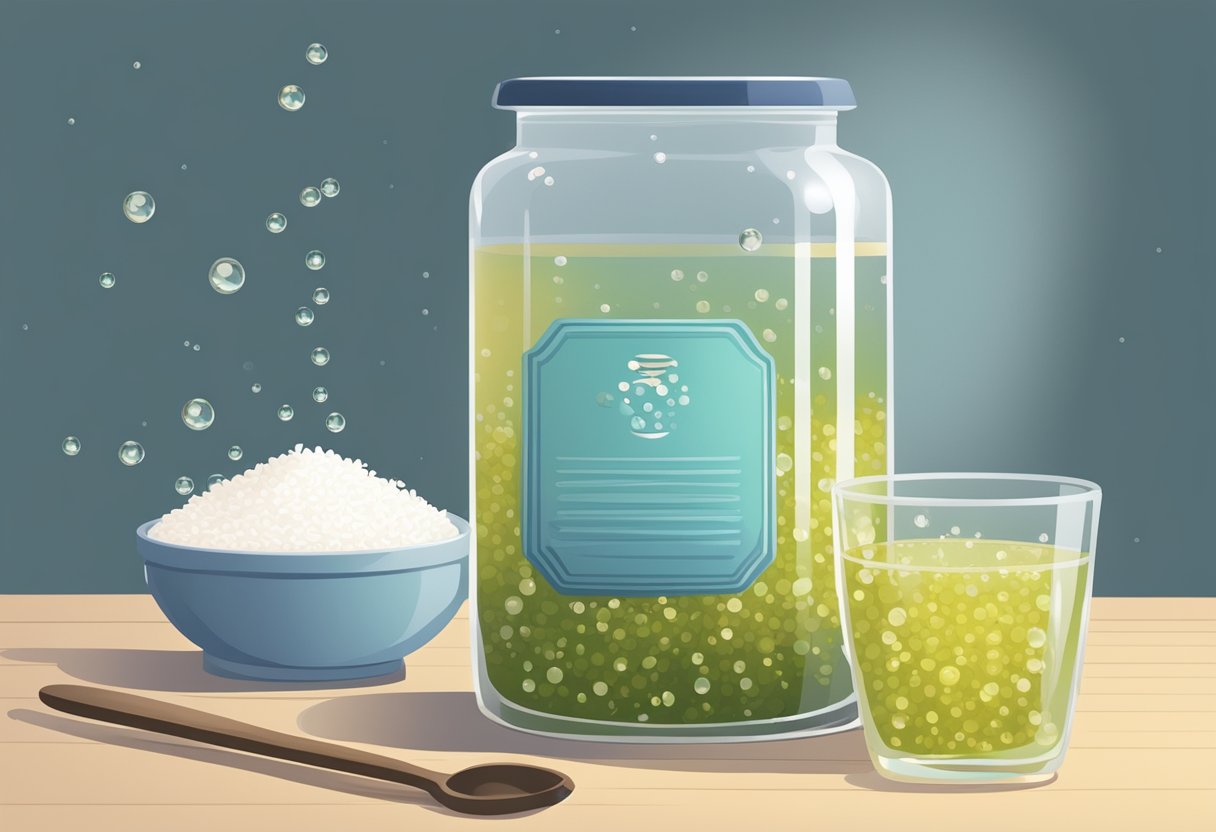
What is the best method to prepare fermented rice water for enhancing hair growth?
There are several methods for preparing fermented rice water, but the most commonly used one involves soaking rice in water for 24-48 hours until it ferments. To make fermented rice water, rinse half a cup of rice and soak it in two cups of water for 24-48 hours. Strain the mixture and store the water in a clean, airtight container.
Can fermented rice water be used to treat hair loss, and if so, how?
Fermented rice water is rich in amino acids, vitamins, and minerals that can help strengthen hair and prevent breakage, making it an effective remedy for hair loss. To use fermented rice water for hair loss, apply it to your scalp and hair, and leave it on for 30-45 minutes before rinsing it out with lukewarm water.
Are there any negative effects of using rice water on hair?
While rice water is generally considered safe for use on hair, excessive use can cause protein buildup, which can make hair stiff and prone to breakage. It is recommended to use rice water on hair no more than twice a week to avoid any negative effects.
What is the recommended duration for fermenting rice water to maximize benefits for hair?
The recommended duration for fermenting rice water is 24-48 hours. During this time, the rice releases a variety of beneficial nutrients that can help improve hair growth, strengthen hair follicles, and prevent breakage.
How often can I apply rice water to my hair without causing damage?
Rice water can be applied to hair once or twice a week, depending on your hair type and condition. It is important to avoid overusing rice water, as excessive use can cause protein buildup and make hair prone to breakage.
What are the specific benefits of using fermented rice water on black hair?
Fermented rice water can help improve the overall health of black hair by strengthening hair follicles, preventing breakage, and promoting hair growth. It can also help to reduce the appearance of split ends and improve hair elasticity, resulting in smoother, more manageable hair.
